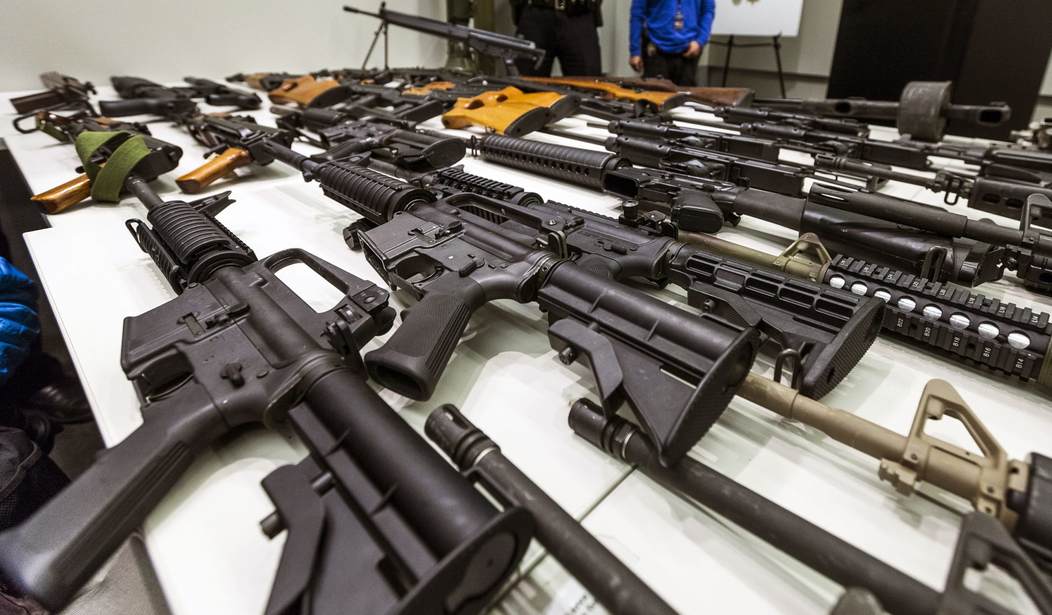WASHINGTON — The House passed on Thursday a bill to prohibit Veterans Affairs from blocking a veteran from buying a gun by labeling them mentally unfit, requiring a judiciary authority to make that determination.
The Veterans Second Amendment Protection Act, introduced by Rep. Phil Roe (R-Tenn.), states “a person who is mentally incapacitated, deemed mentally incompetent, or experiencing an extended loss of consciousness shall not be considered adjudicated as a mental defective” by the VA “without the order or finding of a judge, magistrate, or other judicial authority of competent jurisdiction that such person is a danger to himself or herself or others.”
The bill passed 240-175. Twelve Democrats voted in favor, while two Republicans — Reps. Leonard Lance (R-N.J.) and Dan Donovan (R-N.Y.) — voted against the measure.
“I strongly believe we must do everything in our power to protect the rights guaranteed to all Americans, especially the men and women who have served, by the Constitution. The Veterans 2nd Amendment Protection Act does just that,” Roe said in a statement after the bill’s passage. “I’m proud to stand with my colleagues in passing this important legislation that ensures no veteran who utilizes a fiduciary will lose their Second Amendment rights without due process.”
Roe’s office also released a statement from National Rifle Association executive director Chris Cox: “No veteran should have their fundamental right to self-defense arbitrarily revoked by a government bureaucrat. Receiving assistance to handle personal finances does not mean an individual is unable to safely own a firearm. Denying veterans their Second Amendment rights with no due process is shameful. The NRA and our five million members thank Chairman Phil Roe (TN), Rep. Mike Conway (TX), and Rep. Brad Wenstrup (OH) for their leadership on this important issue.”
House Minority Leader Nancy Pelosi (D-Calif.) said during her Thursday press conference that “it’s really unfortunate that the Republicans have taken it to that place” with the bill.
“I’m sensitive to the concerns of what the due process is involved if someone is incapable of performing some of the duties that people do at a certain age as one of the judgments they make about capability of a senior,” Pelosi said. “I think there should be a little better due process as to how those judgments are made. But I will — I am concerned about guns being without a better process.”
The strongest Dem opposition on the House floor came from Rep. Elizabeth Esty (D-Conn.), who said the bill was rushed through committee and “completely ignores the crisis that many of our most vulnerable veterans are facing.”
“The result of this bill being applied retroactively would mean that if it should pass, more than 170,000 veterans currently prohibited from owning a firearm would be able to pass a background check and buy a gun. While the Chairman expressed his sincere intent and desire that this legislation should not be applied retroactively, it’s fair to say that reasonable people disagree on how this bill would be implemented,” Esty said. “This honest disagreement alone illustrates exactly why this House should be taking its time, on a bill that could have such a profound impact on our nation’s veterans.”
“…Put simply, this bill would make it easier, not harder, for those veterans in crisis to get access to a firearm, by establishing a new judicial requirement that is far higher than any other agency’s or department’s implementation of the Firearms Mental Health Prohibitor, and quite frankly would be impractical if not impossible for the VA to actually use. The VA is already strapped for resources, and it is unclear if it has the legal standing to initiate a legal proceeding such as that suggested in the bill.”
Esty agreed “the current process is over-inclusive” and “we must do more to ensure veterans have sufficient notice, an opportunity to be heard, and a meaningful opportunity to appeal any decision that may impact their constitutional rights.”
“But a wholesale elimination of the VA’s long-established practice to help keep guns out of the hands of veterans who are at serious risk of harming themselves or others is dangerous and misguided,” she argued. “To be clear: of the 170,000 veterans currently prohibited from owning a firearm, as of 2015, almost 20,000 of them were diagnosed with schizophrenia, over 11,000 with dementia, and over 5,000 with Alzheimer’s. For a veteran suffering with a significant mental health condition, like one of these, access to a firearm is a serious matter.”









Join the conversation as a VIP Member